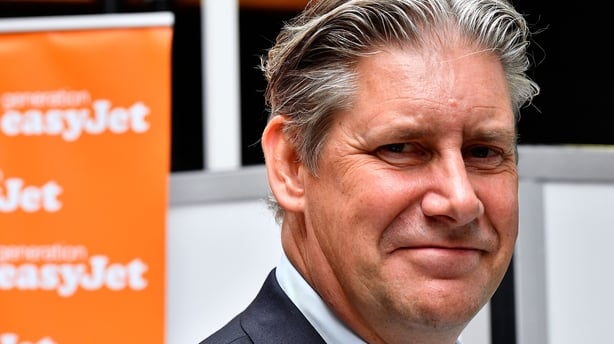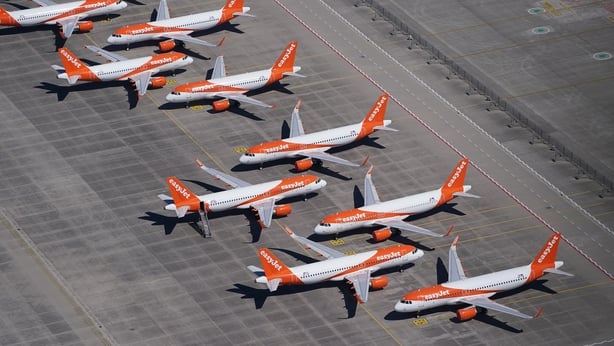EasyJet today posted a record pretax profit of £203m for its third quarter, above analysts' forecasts, on the back of an ongoing rebound in summer travel demand and limited disruption despite ongoing strikes.
Airlines in Europe are set to report strong earnings this quarter as post-pandemic travel demand continues to drive bookings across the continent at similar levels to 2019.
Growth is projected to continue into the winter months.
The airline said it also expected to report record pretax profit for its fourth quarter, the July to September period, as costs per seat flattened with oil prices stabilising.
Ticket yields soared 22% year-on-year.
However EasyJet's CEO Johan Lundgren warned about the potential impact of limited airspace availability and air traffic control strikes in Europe.
"We are absolutely focused on mitigating the impact of the challenging external environment on our customers and flying them on their well-earned holidays," he said in a statement.
He said that so far the strikes had not caused major disruptions.
"As we speak on a daily basis the situation is stable so it's difficult to say what this will be going forward. It's usually down to delays rather than cancellations across European networks," he told journalists on a press call.
The ongoing heatwave in Europe had not impacted or deterred travellers from taking their holidays either, he added.
So far, people were more concerned with finally getting to have their holidays, even in the heat, he said.
But he said the airline would be prepared to change its routes if heatwaves change holiday habits in the years to come.
A report by the European Travel Commission showed that tourists were taking more of an interest in travelling to more northern locales to dodge heatwaves and were booking fewer holidays to the Mediterranean in the peak summer months.
Lundgren said the airline had the flexibility to change routes based on demand, even from one year to another.
"So, I don't assume that this is going to be a big issue for us," he continued.
The airline's optimistic outlook is further driven by robust projections for the winter, with bookings up year-on-year and a capacity increase of more than 15% planned in December.
EasyJet holidays also saw bookings more than double year-on-year for the winter.
"We continue to see good momentum as we move into Q4 where we will be operating over 160,000 flights and expect to deliver another record PBT (profit before tax) performance," Lundgren said.
"We continue to see good momentum as we move into Q4 where we will be operating over 160,000 flights and expect to deliver another record PBT (profit before tax) performance," Lundgren said.
EasyJet aims to expand holiday business into France, Germany
The EasyJet CEO also said today the airline's fast-growing holidays business is on track to become one of the biggest players in Europe and is targeting French and German markets for the next stage of expansion.

While low-cost giant Ryanair sticks to no frills flying, its tangerine-liveried competitor EasyJet is building a travel company to try to grow by selling holidaymakers a bigger slice of their trip.
Former TUI executive Garry Wilson was hired in 2018 by EasyJet CEO Lundgren, his former boss at TUI, to head a digitally focused holiday business that launched the following year, replacing the airline's smaller and mainly outsourced holiday unit.
As travel demand has bounced back after the pandemic, EasyJet holidays is set to boost group profits by more than £80m this year, which Wilson said was just the beginning.
"There's a huge amount of growth we can still have," he said in an interview, noting the airline has 93 million seats per year and customers with holidays as well as flights only account for 4% of those.
EasyJet holidays serves only UK customers, competing with Jet2, TUI and others to sell Mediterranean beach and city break packages, but it will launch over the coming weeks in Switzerland, a market which Wilson called "a gateway".
"France and Germany will then follow probably quite quickly," he said.
The holiday division's strength, Wilson said, is that as well as bringing in new customers, it sells more to existing ones.
Those who usually book a flight and arrange their own hotel are finding they can get a better deal by buying the lot from EasyJet.

The technology behind the website is key, he added.
"We're just over 200 people in the entire holidays business. Some of the traditional tour operators will have three times that just in the IT team," he said. "We've got much lower overheads that we can then pass onto the customer."
Given Britain's cost-of-living crisis, savvy holidaymakers are keen to search out the best value deals.
Wilson said all-inclusive deals have become more popular as they give certainty of cost at a time of rising prices.
Of EasyJet holidays' customers, about 70% book all-inclusive deals, up about 5%-10% on last year, said Wilson, with the rest booking half-board or self-catering.
The surprise, he said, was that customers had not shortened their trips or traded down from more expensive destinations like Greece to cheaper ones like Tunisia.
He attributed that to the pandemic, as people are making travel a priority after around two years of restrictions, but next year could be different, given the squeeze on household incomes.
Package holidays cost 12% more this year than last, according to TravelSupermarket figures.
For those booking for 2024, Wilson predicted inflation should ease.

